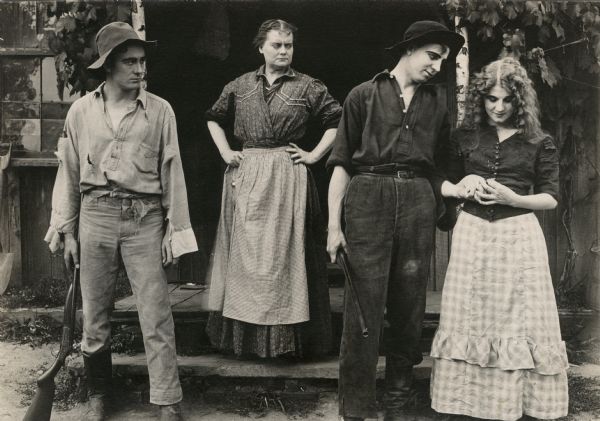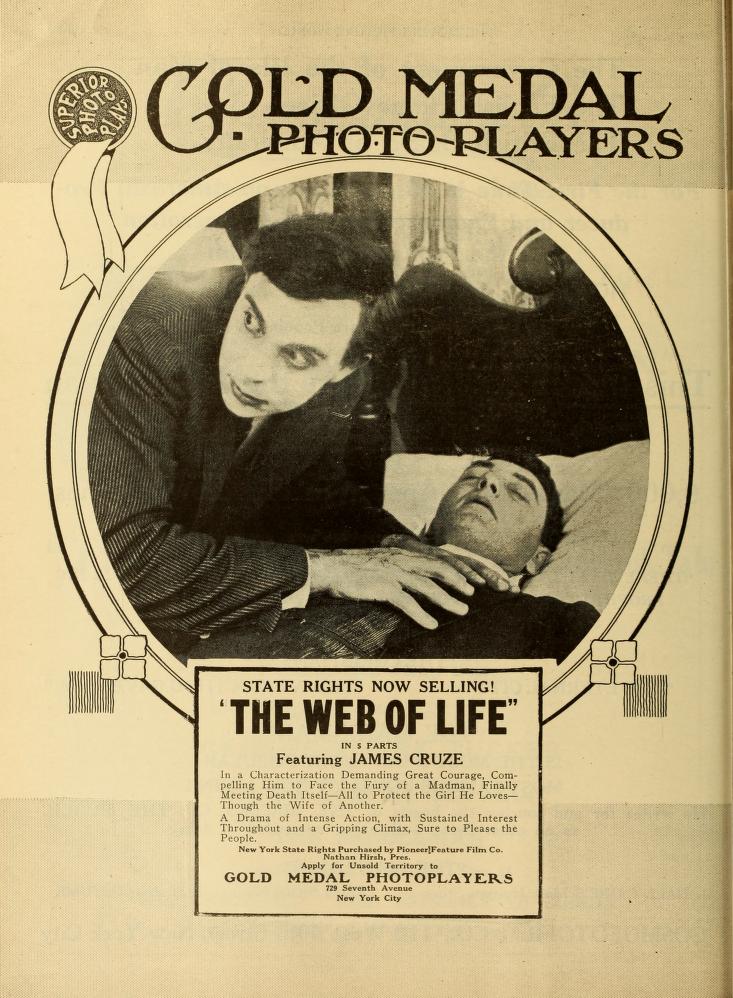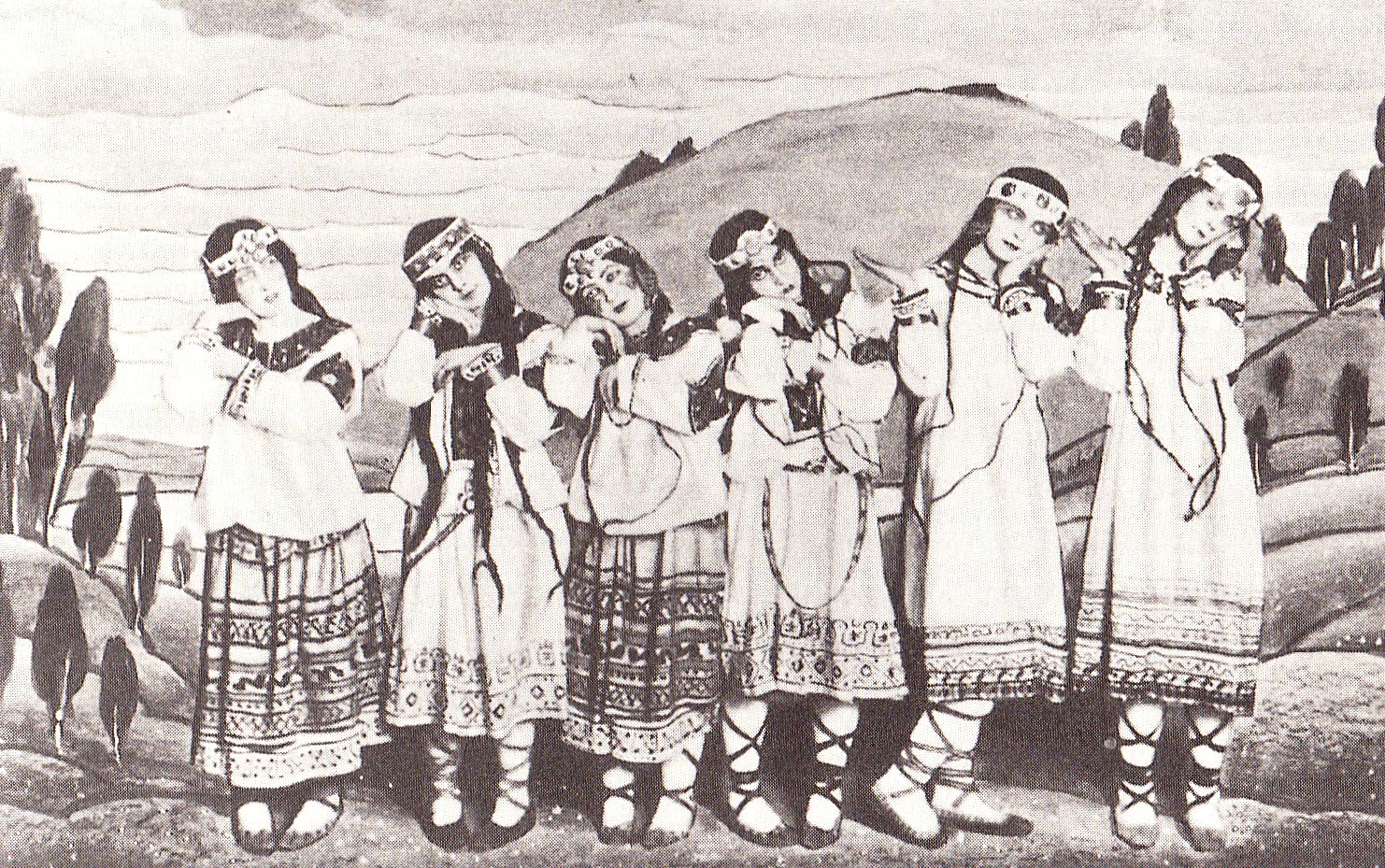|
For Her Boy's Sake
''For Her Boy's Sake'' is a 1913 American silent short romantic drama directed by starring William Garwood, Victory Bateman, James Cruze James Cruze (born James Cruze Bosen; March 27, 1884 – August 3, 1942) was a silent film actor and film director. Early years Cruze's middle name came from the battle of Vera Cruz. He was raised in The Church of Jesus Christ of Latter-day S ..., William Russell and Marguerite Snow. External links * 1913 romantic drama films 1913 films American silent short films American black-and-white films 1913 short films 1910s American films Silent American romantic drama films {{romantic-drama-film-stub ... [...More Info...] [...Related Items...] OR: [Wikipedia] [Google] [Baidu] |
William Garwood
William Davis Garwood, Jr. (April 28, 1884 – December 28, 1950) was an American stage and film actor and director of the early silent film era in the 1910s. Between 1911 and 1913, Garwood starred in a number of early adaptions of popular films, including '' Jane Eyre'' and '' The Vicar of Wakefield'' (1910), '' Lorna Doone'' (1911), '' The Pied Piper of Hamelin'' (1911), '' David Copperfield'' (1911), ''The Merchant of Venice'' (1912), and '' Little Dorrit'' (1913), and ''Robin Hood'' (1913). In total, he starred in more than 150 short and feature films. Early life William Davis Garwood, Jr. was born in Springfield, Missouri. He attended public schools in Springfield before moving to New Mexico at the age of 15. Career Garwood left American Studios after eight months and signed a two-year contract with Universal Film Manufacturing Company in late May 1914. Garwood's first picture for Universal was '' On Dangerous Ground'', released in 1915. By this time, Garwood's pop ... [...More Info...] [...Related Items...] OR: [Wikipedia] [Google] [Baidu] |
Victory Bateman
Victory Bateman (April 6, 1865 in Philadelphia – March 2, 1926 in Los Angeles) was an American silent film actress. Her father, Thomas Creese, and her mother, Elizabeth "Lizzie" Creese, were both actors. On stage, Ms. Bateman appeared in the 1900 tour of "The Man From Mexico" and in the 1919 tour of "Seven Days' Leave". She was born nine days before Abraham Lincoln was assassinated but was named Victory because of the North's eventual win over the Confederate South finishing the Civil War. In the early 1890s she became embroiled in the divorce proceedings of actors Aubrey Boucicault and Amy Busby. Though later exonerated from all involvement in the case Bateman was forced to resign from an all-woman's group called ''The Professional Woman's League''. At one time she was married to Wilfred Clarke, a son of John Sleeper Clarke and Asia Booth; and nephew of Edwin and John Wilkes Booth. They were separated for many years at the time of the Boucicault trial. [...More Info...] [...Related Items...] OR: [Wikipedia] [Google] [Baidu] |
James Cruze
James Cruze (born James Cruze Bosen; March 27, 1884 – August 3, 1942) was a silent film actor and film director. Early years Cruze's middle name came from the battle of Vera Cruz. He was raised in The Church of Jesus Christ of Latter-day Saints, but did not practice the religion after his teenage years. Very little is certain about his childhood and teen years because he told a different story at every interview he granted. Career Cruze acted in, directed and or produced over 100 films mainly during the silent film era. His first known acting job was at Lubin Manufacturing Company in 1910. He started at Thanhouser Company in 1911 with ''She'' (1911) which is where the majority of his body of work was produced, much of it as the leading man. After leaving Thanhouser in 1916, he worked for several other companies as director and producer, primarily for Paramount Pictures, from 1918 to 1938. Cruze struggled to regain his successes of the silent era when sound came to ... [...More Info...] [...Related Items...] OR: [Wikipedia] [Google] [Baidu] |
William Russell (American Actor)
William Russell (born William Lerche; April 12, 1884 – February 18, 1929) was an American actor, film director, film producer and screenwriter. He appeared in over two hundred silent-era motion pictures between 1910 and 1929, directing five of them in 1916 and producing two through his own production company in 1918 and 1925. Early life and career Born in the Bronx borough of New York City, Russell began his acting career on the stage when he was eight years old. He appeared with such notables as Ethel Barrymore, Chauncey Olcott, Blanche Bates, Maude Adams and others. Russell's Broadway credits include ''Princess Flavia'' (1925), ''Cyrano de Bergerac'' (1923), and ''The Tenderfoot'' (1904). His career came to a stop when he was 16, however, when he became an invalid. Through rigorous physical therapy, he recovered his health six years later. He then became an amateur boxing champion. Motion pictures Russell began his screen career in New York with the Biograph Company, w ... [...More Info...] [...Related Items...] OR: [Wikipedia] [Google] [Baidu] |
Marguerite Snow
Marguerite Snow (September 9, 1889 – February 17, 1958) was an American silent film and stage actress. In her early films she was billed as Margaret Snow. Early life Snow was born in Salt Lake City, Utah. Her father, Billy Snow, was a comedian and a minstrel, and the family lived in Savannah, Georgia. Her mother's maiden name was Lutz. After his death, her mother moved the family to Denver, Colorado. Snow attended Loretta Heights Academy and acted in local summer stock plays. While she lived in Denver, she studied acting. Career Snow became an actress at an early age and played many parts while still a child. Her stage career did not begin in earnest until she was sixteen years old. Her first engagement was with James O'Neill in a revival of ''The Count of Monte Cristo'', at the Crawford Theatre in Wichita, Kansas, on February 11, 1907. She played in '' The College Widow'', ''Mrs. Temple's Telegram'', as Elsa in ''The Devil'', and at the Bijou Theater, Wheeling, where as lead ... [...More Info...] [...Related Items...] OR: [Wikipedia] [Google] [Baidu] |
Mutual Film
Mutual Film Corporation was an early American film conglomerate that produced some of Charlie Chaplin's greatest comedies. Founded in 1912, it was absorbed by Film Booking Offices of America, which evolved into RKO Pictures. Founding Mutual's predecessor film businesses began with the partnership behind the Western Film Exchange, founded in Milwaukee, Wisconsin in July 1906. The partnership included Harry E. Aitken, Roy Aitken, and John R. Freuler. In 1910, Freuler also formed a partnership with Chicago film distributor Samuel S. Hutchinson, establishing a production entity known as the American Film Manufacturing Company. In early 1912 the Shallenberger brothers (Wilbert E. and William Edgar), Crawford Livingston, and others as investors including Charles J. Hite, the President & CEO of Thanhouser Film Corporation, joined Freuler and Harry E. Aitken in the formation of Mutual Film. Mutual Film Corporation was formed in 1912 by a group of American businessmen including Ha ... [...More Info...] [...Related Items...] OR: [Wikipedia] [Google] [Baidu] |
Intertitle
In films, an intertitle, also known as a title card, is a piece of filmed, printed text edited into the midst of (i.e., ''inter-'') the photographed action at various points. Intertitles used to convey character dialogue are referred to as "dialogue intertitles", and those used to provide related descriptive/narrative material are referred to as "expository intertitles". In modern usage, the terms refer to similar text and logo material inserted at or near the start or end of films and television shows. Silent film era In this era intertitles were mostly called "subtitles" and often had Art Deco motifs. They were a mainstay of silent films once the films became of sufficient length and detail to necessitate dialogue or narration to make sense of the enacted or documented events. ''The British Film Catalogue'' credits the 1898 film ''Our New General Servant'' by Robert W. Paul as the first British film to use intertitles. Film scholar Kamilla Elliott identifies another early use ... [...More Info...] [...Related Items...] OR: [Wikipedia] [Google] [Baidu] |
Silent Film
A silent film is a film with no synchronized Sound recording and reproduction, recorded sound (or more generally, no audible dialogue). Though silent films convey narrative and emotion visually, various plot elements (such as a setting or era) or key lines of dialogue may, when necessary, be conveyed by the use of intertitle, title cards. The term "silent film" is something of a misnomer, as these films were almost always accompanied by live sounds. During the silent era that existed from the mid-1890s to the late 1920s, a piano, pianist, theatre organ, theater organist—or even, in large cities, a small orchestra—would often play music to accompany the films. Pianists and organists would play either from sheet music, or musical improvisation, improvisation. Sometimes a person would even narrate the inter-title cards for the audience. Though at the time the technology to synchronize sound with the film did not exist, music was seen as an essential part of the viewing experie ... [...More Info...] [...Related Items...] OR: [Wikipedia] [Google] [Baidu] |
Short Film
A short film is any motion picture that is short enough in running time not to be considered a feature film. The Academy of Motion Picture Arts and Sciences defines a short film as "an original motion picture that has a running time of 40 minutes or less, including all credits". In the United States, short films were generally termed short subjects from the 1920s into the 1970s when confined to two 35 mm reels or less, and featurettes for a film of three or four reels. "Short" was an abbreviation for either term. The increasingly rare industry term "short subject" carries more of an assumption that the film is shown as part of a presentation along with a feature film. Short films are often screened at local, national, or international film festivals and made by independent filmmakers with either a low budget or no budget at all. They are usually funded by film grants, nonprofit organizations, sponsor, or personal funds. Short films are generally used for industry experience and ... [...More Info...] [...Related Items...] OR: [Wikipedia] [Google] [Baidu] |
Romantic Drama
Romance films or movies involve romantic love stories recorded in visual media for broadcast in theatres or on television that focus on passion, emotion, and the affectionate romantic involvement of the main characters. Typically their journey through dating, courtship or marriage is featured. These films make the search for romantic love the main plot focus. Occasionally, romance lovers face obstacles such as finances, physical illness, various forms of discrimination, psychological restraints or family resistance. As in all quite strong, deep and close romantic relationships, the tensions of day-to-day life, temptations (of infidelity), and differences in compatibility enter into the plots of romantic films. Romantic films often explore the essential themes of love at first sight young and mature love, unrequited love, obsession, sentimental love, spiritual love, forbidden love, platonic love, sexual and passionate love, sacrificial love, explosive and destructive love ... [...More Info...] [...Related Items...] OR: [Wikipedia] [Google] [Baidu] |
1913 Romantic Drama Films
Events January * January 5 – First Balkan War: Battle of Lemnos (1913), Battle of Lemnos – Greek admiral Pavlos Kountouriotis forces the Turkish fleet to retreat to its base within the Dardanelles, from which it will not venture for the rest of the war. * January 13 – Edward Carson founds the (first) Ulster Volunteers, Ulster Volunteer Force, by unifying several existing Ulster loyalism, loyalist militias to resist home rule for Ireland. * January 23 – 1913 Ottoman coup d'état: Ismail Enver comes to power. * January – Stalin (whose first article using this name is published this month) travels to Vienna to carry out research. Until he leaves on February 16 the city is home simultaneously to him, Hitler, Trotsky and Josip Broz Tito, Tito alongside Alban Berg, Berg, Freud and Jung and Ludwig Wittgenstein, Ludwig and Paul Wittgenstein. February * February 1 – New York City's Grand Central Terminal, having been rebuilt, reopens as the ... [...More Info...] [...Related Items...] OR: [Wikipedia] [Google] [Baidu] |
1913 Films
Events January * January 5 – First Balkan War: Battle of Lemnos – Greek admiral Pavlos Kountouriotis forces the Turkish fleet to retreat to its base within the Dardanelles, from which it will not venture for the rest of the war. * January 13 – Edward Carson founds the (first) Ulster Volunteer Force, by unifying several existing loyalist militias to resist home rule for Ireland. * January 23 – 1913 Ottoman coup d'état: Ismail Enver comes to power. * January – Stalin (whose first article using this name is published this month) travels to Vienna to carry out research. Until he leaves on February 16 the city is home simultaneously to him, Hitler, Trotsky and Tito alongside Berg, Freud and Jung and Ludwig and Paul Wittgenstein. February * February 1 – New York City's Grand Central Terminal, having been rebuilt, reopens as the world's largest railroad station. * February 3 – The 16th Amendment to the United States ... [...More Info...] [...Related Items...] OR: [Wikipedia] [Google] [Baidu] |









